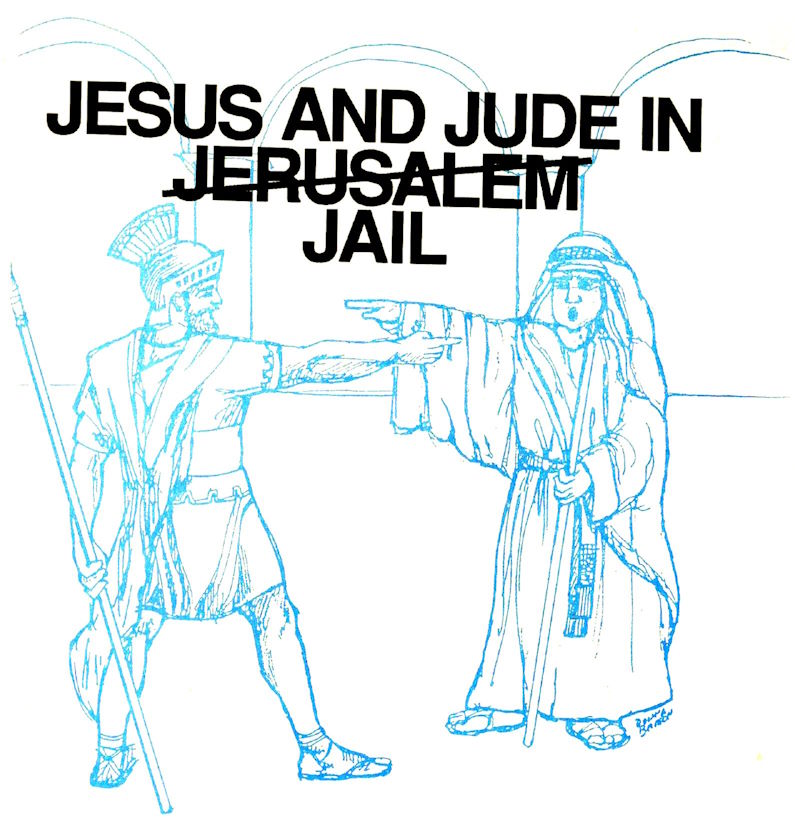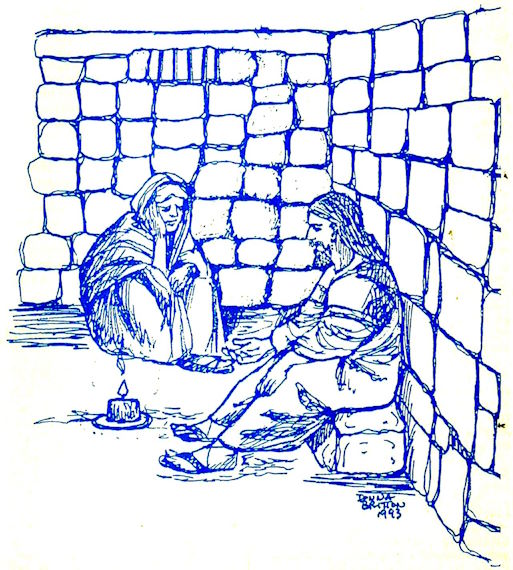© 1993 Wayne Ferrier
© 1993 The Fellowship for readers of The Urantia Book

By Wayne Ferrier, Williamsport, Pennsylvania
It was well past noon when Jesus and Jude arrived in Jerusalem but the two brothers still had time to register Jude for the Passover ceremonies where he would become a “Son of the Law,” a full fledged, grown up, and responsible citizen of the people of Israel. They also hoped to have time to take a look around.
“Jerusalem, you are magnificent!” Jude announced to the city. They were nearing the temple and he could hardly get there fast enough. Even when he had first seen the temple from the outskirts of Jerusalem Jude’s breath had been taken. “This is truly the heart of Israel!” he cried. Jude was bubbling with enthusiasm but Jesus’ only reaction was a cordial nod and a warm smile. Jesus remembered the elation he felt when he toured Jerusalem when he was twelve. Jesus also recalled how his first visit to the temple had disagreed with him. Being initiated as a full citizen of Israel was a big deal but to Jesus, the ceremony of sacrificing defenseless lambs hardly seemed God-like, not his vision of God, anyway.
Both brothers had a tendency to drift in their thoughts and hardly noticed Lazarus of Bethany until he was right in front of them. Lazarus had been friends with Jesus since the Passover when he was twelve years old. At that time, Jesus and his family were staying ovemight at the house of Simon of Bethany, Lazarus’ father while Jesus was being initiated. Lazarus had grown very fond of Jesus during their visit and he was overjoyed to see his friend again.
“Jesus!” Lazarus called, “I was hoping that I would find you here.”
“I am going to become a Son of the Law during the Passover ceremonies,” stated Jude without giving Jesus a chance to speak.
“And peace be with you my friend, Lazarus,” Jesus said, politely cutting in, “This is my brother, Jude.”
“After the ceremonies will you have a chance to celebrate with us at my home in Bethany, Jude?” But Jude did not hear Lazarus’ invitation, he had absentmindedly wandered off and was taking in the sites. Jesus and Lazarus watched as he meandered through the crowd. The city was indeed a sight for those who were new to the experience. The very rich and the very poor existed side by side. In one glance one could see the humblest holy man and at the same moment the most profane sinner.
Vendors were scattered everywhere, calling out to pedestrians and those who rode by on donkeys, “Buy these fine baskets! Buy my wine! Fresh fruit and vegetables for sale!” Every conceivable object could be obtained at the right price if one were skilled in the art of shrewd negotiation. And, just standing back and watching the sheer diversity of people that were on the streets could entertain anyone for hours. Jesus and Lazarus laughed. It was all too apparent that Jude was enjoying his first visit to the holy city.
“If the Father’s will permits, we’ll certainly try to stop over,” said Jesus. He was happy to see his friend and hoped to see his other friends in Bethany. As they were discussing the details of their get-together, they were interrupted by a disturbance not far away. Two Roman soldiers had made obscene gestures towards a young Jewish girl. They were whistling and laughing at her when Jude addressed the crowd who was watching the spectacle.
“What fools these Romans are! Swine in the sty are of more substance than the likes of them!” The Romans were not the kind to take such a response lightly and they set upon Jude and promptly arrested him. Before Jesus had time to step in and defuse the situation, Jude made matters worse by showering the Romans with all kinds of nasty insults. Years of bottled-up frustration against the Roman Empire surged from deep within him. Jude let his indignation roar and it got the better of him. In his heart, Jesus’ little brother felt that the Romans had no right to be in their country. He had temporarily forgotten about the initiation ceremonies and knew only that he could not tolerate such indignity.
Alas, Jude ended up in military prison. The sun was setting, the last final rays fell through the little window at the top of his cell. The stone walls felt cool and it was dusty and bleak inside. He had been there several hours.
Meanwhile, Jesus tried his best to have his brother released. After waiting a long time, the magistrate finally saw him.
“My brother is young and unthinking like so many of his age; he has traveled here intending to participate in the Passover ceremonies, and of course, he had no intention of squabbling with the authorities. His tongue is quick but he is harmless. The ceremonies begin shortly,” Jesus implored. “Surely you can make an exception and let him attend.”
But the magistrate remained steadfast. “You seem like a reasonable man but your brother is a hothead! I might consider an early hearing. But during the festival time it is neither wise nor prudent to release him. We cannot risk unrest. Besides, maybe a few days in prison will squelch your brother’s radical temper. Another flare-up like this can be of no good to you nor will it be of any good use to Jerusalem this evening. I’ll hear your case the day after Passover.” And with that Jesus was dismissed.
Jesus returned to the hoosegow with the news. He had brought a lit candle and handed it to Jude. As the night set in Jesus kept Jude company. The flame slowly melted away and the candle grew smaller and smaller. The night came and both brothers fell asleep.
Two days passed and Jude was released. Jesus argued in his brother’s behalf and apologized to the magistrate for Jude’s outburst. It was humiliating for Jude, especially since he felt that the soldiers had been wrong. He appreciated being free again but the Passover ceremonies in the temple were over and Jude missed his chance to be formally initiated as a lawful Son of Israel in the annual temple rites.
On the way home Jesus and Jude stopped at Lazarus’ house.
“What will your mother say when she hears about this?” Lazarus asked, taking Jesus aside and out of reach of Jude’s ears.
“It is not my purpose or desire to handle my brother’s responsibilities,” Jesus answered.
Lazarus looked puzzled. “I do not understand,” he said. “Not your purpose? And what if he does not reveal the truth?”
“Then the family will not know what happened,” replied Jesus.
On the road home Jude was deep in contemplation. Jesus was inclined to make the journey with others who were heading in the same direction but Jude persuaded him to walk home together without company. Jude was in no mood to socialize. His anxiety rose with each passing mile. They traveled by many landmarks that he recognized from his joumey down to Jerusalem, the old shade tree where they had partaken of a midday meal, a lookout on top of a hill where the countryside was visible for many miles, and the stone ovens where two old women made and sold unleavened bread for the travelers. None of these places seemed to have the charm that they had when he had first visited them.
Birds were singing, gloriously celebrating spring, but all Jude could think about was what his mother would say when she heard the bad news. What was Jesus thinking? Could he ever be forgiven? He looked ahead on the road and pondered on what the future might hold.
Jesus never did tell the family about what happened to Jude during their visit to Jerusalem. Jesus never told, but Jude eventually did.

Ed. Note: This story is from The Urantia Book: UB 128:6.5-8